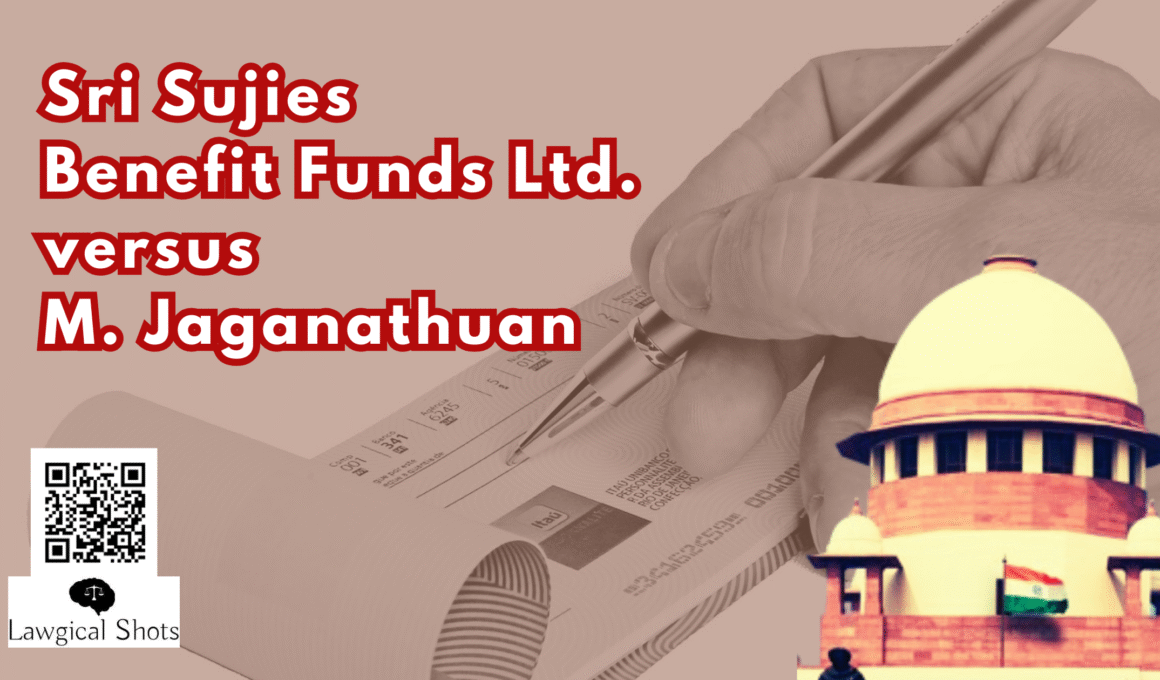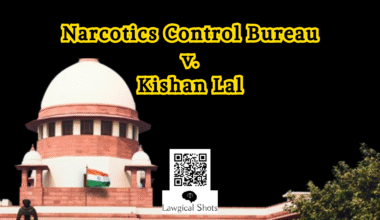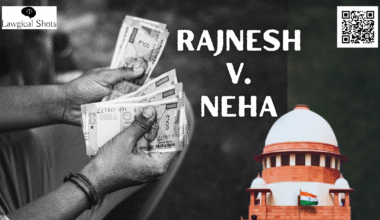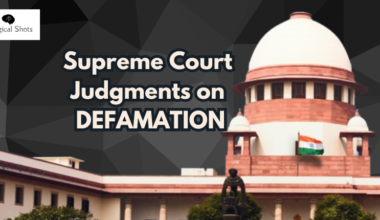Cheque bounce cases have become increasingly common in India, particularly since financial transactions heavily rely on cheques. Section 138 of the Negotiable Instruments Act, 1881, plays a significant role in maintaining the credibility of cheques and protecting the rights of the payee.
Today, let us comprehend the case of Sri Sujies Benefit Funds Ltd. v. M. Jaganathuan as it is an important decision that addresses the key aspects as to whether there was:
- A legally enforceable debt
- The procedural steps under the act were complied with.
This case also provides insight as to how the courts handle situations where the accused disputes the existence of liability.
Applicable Laws for Cheque Bounce
Primarily, this case concerns Section 138 of the Negotiable Instruments Act, 1881, which lays down the consequences of a cheque bounce. It states that a cheque issued for the purpose of discharging legal debt when dishonored is a punishable offence under the said section.
The following are the legal requirements that must be fulfilled to constitute an offence under section 138.
- Issuance of a cheque
- Dishonour of a cheque
- Proper notice sent by the payee
- Failure by the issuer to make the payment within 15 days from the receipt of the notice.
In this case, Section 139 of the Negotiable Instruments Act which provides for a presumption in favour of the holder that the cheque was issued for the discharge of a debt or liability, is also a point of discussion
Sri Sujies Benefit Funds Ltd. versus M. Jaganathuan
Complainant: Sri Sujies Benefit Funds Ltd.
Accused: Ms. Jaganathuan
Factual Background of the case
- The dispute began when Sri Sujies Benefit Funds Ltd., a financial company, received a cheque from the respondent, M. Jaganathuan.
- This cheque was meant to settle a financial obligation that had arisen as part of a prior transaction or membership in a financial scheme.
- When the cheque was presented to the bank, it was returned unpaid due to the respondent’s account being closed.
- In response, the company sent a legal notice demanding the payment of the cheque amount.
- However, the respondent did not comply within the time prescribed by law. As a result, the company proceeded to file a complaint before the Magistrate’s Court under Section 138 of the Negotiable Instruments Act, initiating criminal proceedings for dishonour of a cheque.
Point of Law in Sri Sujies
In this case, the main issue, or the point of law was to determine whether the presumption under section 139 of the Negotiable Instruments Act which assumes that a cheque was issued in discharge of a legally enforceable debt or liability, can be rebutted merely by claiming that the cheque was issued as security without supporting evidence.
Overview of the arguments by the Complainant
Sri Sujies Benefit Funds Ltd., the complainant in this case, argued that:
- Existence of Legally Enforceable Debt
The cheque was issued by the accused in repayment of an outstanding liability arising from his subscription to a financial scheme operated by the company. Therefore, the debt was legally enforceable.
- Cheque Issuance and Dishonour Not Denied
The fact that the accused had issued the cheque and that it was dishonoured due to insufficient funds was not in dispute. This triggered the presumption under Section 139 of the Negotiable Instruments Act in favour of the complainant.
- Statutory Compliance
The complainant had followed all procedural requirements under Section 138. This included issuing a legal demand notice to the accused and filing the complaint within the prescribed time period after non-payment.
- Presumption Not Rebutted by Accused
The petitioner emphasised that the accused failed to produce any convincing evidence or documentation to rebut the presumption of liability. A mere claim that the cheque was issued as security was not enough.
Overview of the arguments by the Accused
M. Jaganathuan, the accused, contested the complaint on the following grounds:
- Cheque Issued as Security, Not for Debt Repayment
The accused claimed that the cheque in question was not issued to discharge any specific liability but was given only as a form of security. He argued that no enforceable debt existed at the time of cheque issuance.
- No Legally Enforceable Debt
He further contended that there was no proper documentation or acknowledgment of the alleged financial obligation, and therefore, no legal debt could be said to exist.
- Failure to Prove the Debt
According to the accused, the complainant had not placed any concrete evidence to prove that he owed money at the relevant time. He relied on this to argue that the presumption under Section 139 had been rebutted.
Court’s Evaluation of the Arguments
The court examined the evidence and arguments presented by both sides and concluded that:
- The execution of the cheque was not denied by the accused.
- Once the issuance of the cheque was admitted, the burden shifted to the accused to rebut the presumption under Section 139.
- A simple claim that the cheque was given as security, without producing any supporting material, was insufficient.
- Closure of bank account within a few weeks of issuing the cheque raised serious concerns.
- The complainant had fulfilled all the legal requirements under Section 138.
Conclusion
- The case of Sri Sujies Benefit Funds Ltd. v. M. Jaganathuan highlights the strict stance courts take on cheque dishonour under Section 138.
- It reinforces that once a cheque is issued and dishonoured, the burden lies on the accused to prove that no debt existed.
- A mere claim of the cheque being a security without evidence is not enough. The judgment strengthens the legal framework that ensures trust in financial transactions.
The Supreme Court Judment in Sri Sujies Benefit Funds Ltd. v. M. Jaganathuan has been analysed by our intern, Ms Tisha Parmar. She has been assisting the team in bringing informational legal blogs.








